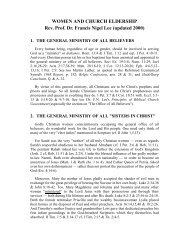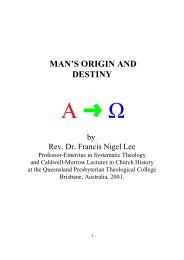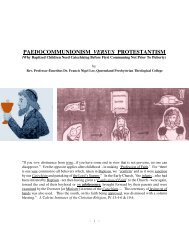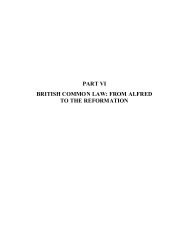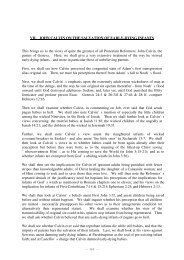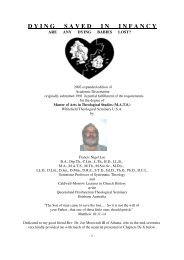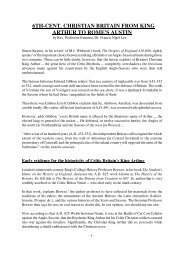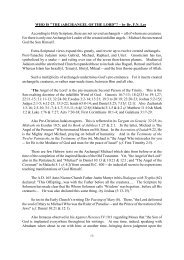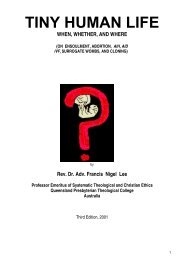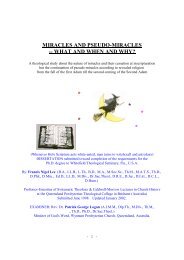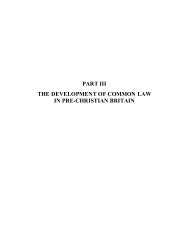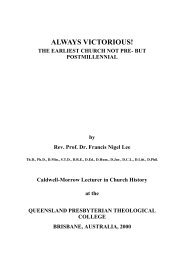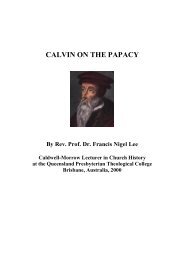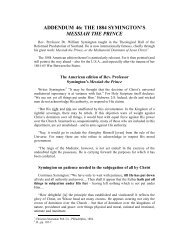THE CHRISTIAN AFRIKANERS - The Works of F. N. Lee
THE CHRISTIAN AFRIKANERS - The Works of F. N. Lee
THE CHRISTIAN AFRIKANERS - The Works of F. N. Lee
You also want an ePaper? Increase the reach of your titles
YUMPU automatically turns print PDFs into web optimized ePapers that Google loves.
philosophy, Van Til sees a beautiful outworking <strong>of</strong> the Van Tillian principle <strong>of</strong> the OntologicalTrinity -- as reflected in creation. Furthermore, says Stoker, each ontic reality (or substance as hecalls it) also possesses freedom in its own ability. That is to say, everything in the universe has itsown peculiar nature -- by which it develops and expresses itself.Everything in the universe further has universality in its own ability. That is to say, each substanceaffects and is affected by every other substance in the universe. In fact, this is the counterpart <strong>of</strong> theold physics, that said: "Be careful when you breathe; because when you breathe, you shake the starson the other side <strong>of</strong> the universe." Of course, this is perfectly true. That is why it is so importantthat we keep God's Law and do the right thing. Because we disturb the equilibrium throughout thecosmos when we sin!For these reasons, says Stoker, the cosmos consists not merely <strong>of</strong> fifteen Dooyeweerdian lawspheres-- the numerical sphere through the so-called pistic (as fifteen little globes strung togetherin cosmic time like beads on a necklace). No! <strong>The</strong> cosmos rather consists <strong>of</strong> various cones --wedged together like slices <strong>of</strong> a Christmas cake cut apart from one another but not removed fromone another. Or, Stoker says elsewhere -- like a bicycle wheel with God as the axle at the centre,and all <strong>of</strong> the spokes radiating out from God and connected with God and then also to the tyre(representing the outer rim <strong>of</strong> the universe).Each cone <strong>of</strong> Stoker's "Christmas cake theory <strong>of</strong> the universe" supports all <strong>of</strong> the other cones orwedge-shaped slices <strong>of</strong> cake. One <strong>of</strong> these cones or wedges contains all <strong>of</strong> the law-spheres <strong>of</strong>Dooyeweerd. <strong>The</strong> other cones <strong>of</strong> the round cake contain different substances -- such as values,causation, and qualities. You need all <strong>of</strong> these cones or wedge-shaped pieces <strong>of</strong> the Christmas cake,says Stoker, in order to explain the entire universe. What is more, he adds, the individual createdbeings in the universe (which he calls "existences") also cut right across the entirety <strong>of</strong> these conicalor wedge-shaped schemes. It is only in the divine createdness <strong>of</strong> the cosmos as a whole, and <strong>of</strong> eachcreature in the cosmos, that the ontic unity can be established.Now Stoker has insisted that what Dooyeweerd regards as the modal sphere <strong>of</strong> history is in fact adistinct cone or wedge <strong>of</strong> the Christmas cake -- quite different from all <strong>of</strong> the Dooyeweerdian lawspheres.Stoker has also advocated a new motive -- for the understanding <strong>of</strong> existentialism today.Dooyeweerd only takes you up to Late Liberalism. He finds a tension, in Late Liberalism, betweenthe "freedom motive" and the "science motive." But Stoker believes we need to go beyond that, inorder to understand modern existential man -- modern man whom Rushdoony so beautifully investswith a "present-oriented low-class existentialistic mentality."Stoker feels existential man is locked into a dichotomistic tension between contingency andmeaning. Nothing has any meaning. Life has no meaning. But then -- purely contingently -- manfeels hungry etc. "I'd better go eat some food -- and it has meaning! I eat food now -- but then, afterthat, why am I alive?" We all recognise this motive very much, in the times in which we live.<strong>The</strong>re is also another very strong difference between Stoker and Dooyeweerd. To Stoker, theologyis not just the special science <strong>of</strong> the so-called pistic sphere, as Dooyeweerd believes. Still less istheology dependent upon the principles <strong>of</strong> the one and only general science <strong>of</strong> philosophy, asDooyeweerd believes. To Stoker, theology is the general science which studies the Creator's Selfrevelationin Scripture -- alongside the other general science <strong>of</strong> philosophy (which studies thecreation revelation as a whole in nature) as well as alongside all <strong>of</strong> the special sciences (each <strong>of</strong>which studies a part <strong>of</strong> creation revelation). And all <strong>of</strong> these sciences -- philosophy, theology andthe special sciences -- borrow from and lend to one another. More importantly, they must all do soin subjection to the teaching <strong>of</strong> the Word <strong>of</strong> God!



